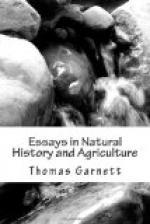Fifth.—All nets and other devices for catching Eels should be prohibited in April, May, and June.
Sixth.—Close time should be altered and extended, as well as made uniform, in all rivers.
Seventh.—The sale and use of Salmon roe should be prohibited.
Eighth.—Justices should be enabled to assist the passage of fish over weirs by any contrivance which did not impair their stability nor the efficiency of the water power.
Ninth.—All cruives should be formed of vertical bars, and should have the intervening spaces to measure not less than three inches.
Tenth.—No nets used in a Salmon river should measure in the mesh less than two inches and a half from knot to knot.
Eleventh.—Any person having no right of fishing found with a net in his possession or a Salmon out of season, should be guilty of misdemeanour.
Twelfth.—A ten shillings’ licence for angling for Salmon.
The reasons for most of these suggestions will be obvious to you, but there are some which may not be so; I will therefore give a short comment on such.
Third and fourth.—The conservators shall have the right to inspect all wheel-races, cruives, &c., to see they are properly regulated, and also to see that no contrivance is used to drive the fish back. In the evidence given before the House of Commons in 1825, it was proved that the lessee of a fishery in Scotland used to place a crocodile painted red in the king’s gap, which the law compelled him to give from Saturday night till Monday morning.
Fifth.—The prohibition to set Eel nets in April, May, and June is to prevent the destruction of Smolts when going down to the sea.
Seventh.—Salmon are destroyed here when spawning chiefly for the sake of the roe. If a man were fined for selling it or having it in his possession, this inducement would be weakened.
Eleventh.—There is the same reason for seizing the net of the black fisher that there is for seizing the snare of the poacher, and if the latter can be convicted for having hares or snares in his possession, I do not see why the former should not for having nets and Salmon.
A meeting of the gentlemen interested in the fisheries of the Ribble and the Hodder will be held on Friday, the 17th instant, previous to which time I should be glad of your criticism.
I am, dear Sir,
Yours very truly,
THOMAS GARNETT.
P.S.—It occurs to me since closing my letter that I have forgotten one important provision required in any new Act of Parliament—namely, protection to the Smolts in their downward migration. Here the pools are swept with small meshed trammel nets of all the fish that they contain.
* * * * *
ARTIFICIAL PROPAGATION OF FISH.
CLITHEROE, 23rd April, 1863.
To the Editors of the “Leeds Mercury.”




